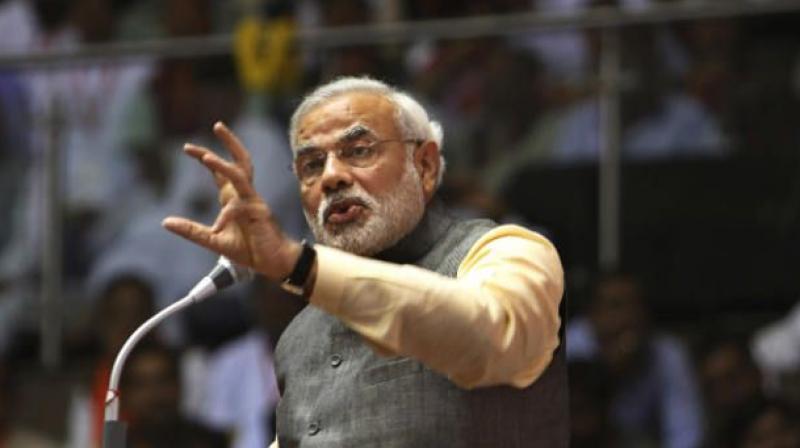Harmonise global laws on conservation of agro-biodiversity: PM

New Delhi: Expressing concern over extinction of some plant and animal species, Prime Minister Narendra Modi on Sunday said global laws on conservation of agro-biodiversity should be harmonised in a way that they do not hamper growth of the agriculture sector in developing nations.
He also cautioned against ignoring sustainable development and conversation of biodiversity while finding solutions to poverty, malnutrition and hunger through science and technology.
Addressing the first International Agro-biodiversity Congress, Modi emphasised on focused research and proper management of genetic resources.
As threat to genetic resources is going to increase in the coming days, there should be "shared vision" with pooled resources from national, international, private bodies and scientific experts across the world towards conservation of biodiversity, he said.
"We will have to see how various laws related to agro- biodiversity can be harmonised so that they do not come in the way of development of agriculture and farmers," he said.
"People have exploited natural resources blindly in the name of development. As a result, challenges are going to grow in the coming days. In the current scenario, discussion and research on agro-biodiversity are very important for achieving global food, nutrition, health and environment security," he added.
Modi expressed concern over extinction of 50-150 species every day and said that in the coming years there is a threat to one out of eight birds and one-fourth of animals.
He added that biodiversity conservation should be more a matter of individual consciousness than rules and regulation.
"World over, crores of people are fighting hunger, malnutrition and poverty. To address these issues, science and technology is very important. While finding solution to these problems, we should not ignore sustainable development and conservation of biodiversity," Modi said.
Highlighting that India is rich in agro-biodiversity, he said the country has 6.5 per cent of the world's biodiversity and feeds 17-18 per cent of the global human and animal population with only 2.5 per cent of the land resources.
"Our country is agriculture based and more than 50 per cent of the population is dependent on it. Our philosophy has been to keep natural resources intact and focus on development. Even development programmes across the world are based on this philosophy," he said.
Stating that the problem of climate change has been due to imbalance in nature, Modi said, "In view of global warming threat, we have ratified Paris agreement on October 2. India is playing a leading role."
In the first international conference on biodiversity held in the national capital, about 900 delegated from 60 countries are deliberating on the issue of conservation of agro-biodiversity.
Stating that each nation is adopting different ways to protect agro-biodiversity, Modi said, "It would be appropriate if we prepare a register to keep a record of all such practices and then do research to find out which practices need to be promoted."
He talked about the negative impact of science and technology and suggested "audit of development of science".
"Science and technology is important for addressing malnutrition, hunger and poverty, but we will see to that how technology is impacting us...we need to be alert on negative impact of technology," he said, while citing example of usage of pesticide hindering honeybee in pollination process.
On the extinction of genetic resources, Modi said 50-150 species are getting extinct every day despite adoption of recommendation of the 1992 biological diversity convention.
"In the coming years, there is threat of extinction of one out of eight birds and one fourth of animals. We will have to change our thinking. We need to focus on conserving our current resources and also strengthening it. All countries will have to learn from each other. This will happen when we focus on research in the area of agro-biodiversity," he said.
Elaborating on the richness of India's biodiversity, Modi said there are more than 47,000 plant species and over 89,000 animal species, besides over 8,100 km of coastal areas.
"India's agriculture philosophy has been to keep natural resources intact and conserve it and utilise it as per the requirement. Even development programmes across the world are based on this philosophy," he said.
India has been able to protect genetic resources as the ancestors linked agri-produce with our culture, he said citing various examples.
The country has been able to conserve many varieties including 'Konamani' rice variety in South India, 'Agnibora' in Assam, 'Bhalia' wheat in Gujarat, he added.
India has also helped other nations in conserving agro- biodiversity, Modi said, noting that Haryana's buffalo breed 'Murah' and Gujarat's 'Zafrabadi' are known as international trans-boundary breeds.
He pointed out however that the country has been able to register only 160 animal species and urged greater focus on research in this area to identify more species.

